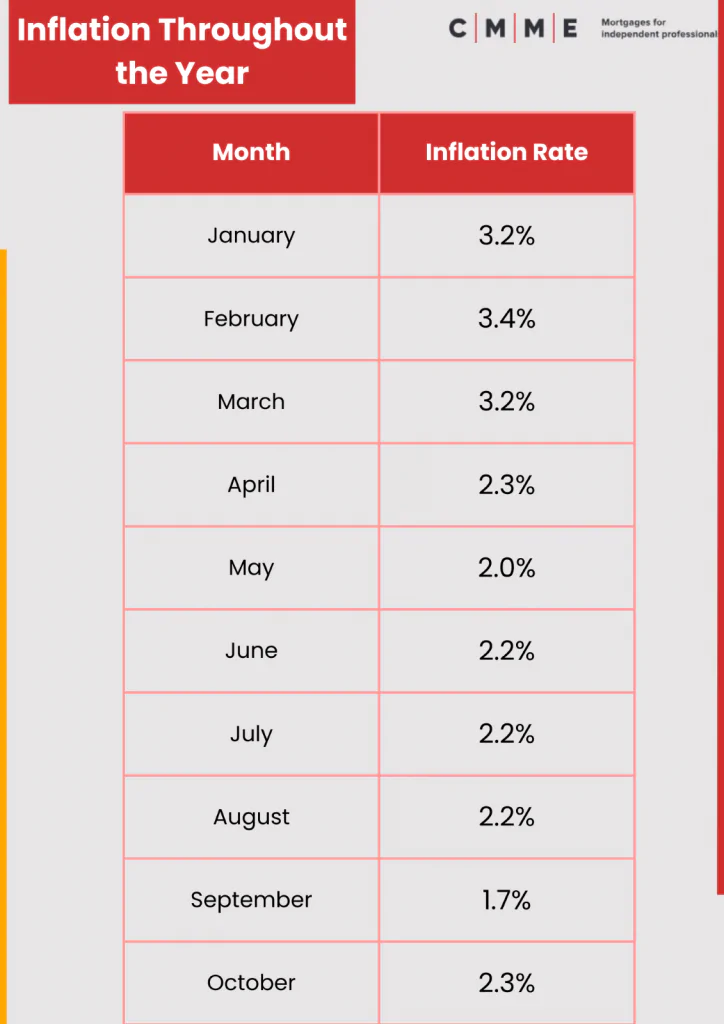
November 22nd, 2024
Introduction
The recent announcement of a 0.25% reduction in the Bank of England’s base rate initially brought speculation of some future respite for mortgage borrowers. However, we have recently seen the opposite take effect, as the final sub-4% products recently left the market, leaving aspiring mortgage borrowers to ask how much the base rate truly influences your potential new deal.
For self-employed professionals who have to manage fluctuating incomes and plan long-term financial commitments, understanding this trend is crucial for navigating today’s unpredictable housing market.
This article explores the reasons behind this apparent contradiction and highlights what self-employed professionals need to consider when approaching mortgage providers in the current climate.
Why Mortgage Rates Are Rising
1. Economic Uncertainty and Inflation Concerns Lenders don’t just base their rates on today’s base rate—they also consider future economic trends. Despite the reduction in the base rate, UK inflation remains stubbornly high, rising to 2.3% in October. Persistent inflation raises fears that the Bank of England may eventually need to increase rates again, keeping mortgage rates high in the interim.

Some believe one of the contributors to increasing inflation is the Autumn Budget’s changes to employer national insurance contributions, whilst others put forward that Trump’s presidential re-election could be a factor.
For contractors and freelancers, inflation’s impact on daily expenses adds an additional layer of financial pressure, making it even more important to lock in favourable mortgage terms.
2. Government Borrowing and Its Ripple Effect Increased government borrowing to fund public spending is driving up the cost of government bonds (gilts). These bond yields often serve as a benchmark for fixed-rate mortgages. Consequently, lenders are raising rates to reflect higher costs.
This is particularly relevant for contractors who rely on fixed-rate mortgages for budget stability, as these products are becoming increasingly expensive.
3. Lender Risk Management Self-employed borrowers are typically viewed as higher-risk customers due to variable income patterns. Recent changes in the mortgage market have prompted lenders to tighten their lending criteria further. Many banks are revising their rates upward to mitigate potential risks, even as competition within the lending market fluctuates.
For contractors, this means fewer competitive deals and more scrutiny of income evidence, making it vital to work with a broker who understands the unique challenges of self-employment.
Since This is the Case for Fixed Rates, Should I just Get a Variable Product?
Variable-rate mortgages could be a good option in the current environment for a few key reasons, particularly for contractors and self-employed professionals who are carefully balancing fluctuating incomes and financial stability:
- Potential lower monthly repayments: Variable-rate mortgages are directly influenced by the Bank of England’s base rate. With the recent reduction in the base rate, these mortgages may offer lower initial payments compared to fixed-rate deals, which are currently climbing due to broader economic pressures.
If the base rate continues to drop or remains stable, contractors could benefit from lower monthly repayments, freeing up cash flow for other expenses or savings.
- Changing Market Flexibility: In a fluctuating market, variable rates provide flexibility. Since the base rate has just been reduced, there’s the potential for further decreases, especially if inflation stabilises or economic growth slows. This could make variable-rate mortgages an attractive short-term option for those willing to take on some risk for potential savings.
For contractors and freelancers who may already adapt well to changing circumstances due to the nature of their work, this flexibility could align with their financial mindset.
- Opportunity to Switch Later
Variable-rate mortgages can act as a temporary solution while waiting for the market to stabilise. If fixed rates eventually decrease in line with broader economic improvements, borrowers with a variable rate could switch to a fixed deal later, securing long-term payment stability at a potentially lower rate.
For contractors, this option ensures they can remain adaptable without committing to high fixed rates at a time of uncertainty.
Be careful however. If you did go down this route, you’d need to be aware of:
- Fluctuating Monthly Payments: If the base rate rises unexpectedly, monthly payments on variable mortgages can increase, potentially straining budgets.
- Income Stability: Contractors with inconsistent monthly income may find it harder to manage these fluctuations.
Before you do anything, we’d recommend speaking to your broker to establish the best plan based on your circumstances.
Conclusion
For contractors and self-employed professionals, the rising mortgage rates amidst a declining base rate underscore the need for strategic financial planning. Lenders’ caution, economic uncertainty, and inflationary pressures are reshaping the market, making it essential to stay informed and proactive.
No matter the climate, CMME are on hand to find you the best possible deal regardless of your financial situation. Want to learn more, book in for a FREE no obligation chat with our team today.
At CMME, we’re dedicated to helping self-employed professionals overcome these challenges. Reach out to us today to explore your options and make confident decisions about your mortgage journey.



